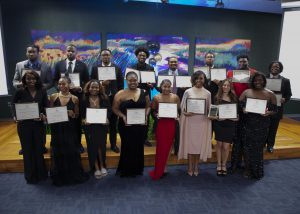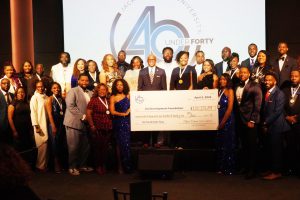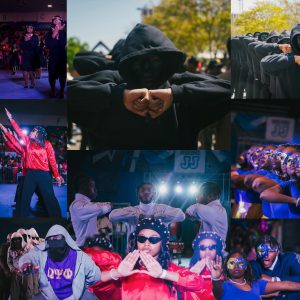
Special to the Flash
The Mississippi Humanities Council partnered with Jackson State University to host a symposium, Celebrating the Legacy of the Black Press on JSU’s main and downtown campuses.
The symposium is a part of a yearlong, national observance of the Pulitzer Prize centennial, designed to inspire the next generation of journalism and humanities students to understand and examine the values exhibited by Pulitzer-worthy work.
Stuart Rockoff, the executive director of the MHC, said the symposium and the MHC each “create opportunities for Mississippians to learn about themselves in a larger world and to enrich communities through civil conversations about our history and culture.”
Rockoff said the MHC wanted to hold an event acknowledging the importance of black journalism in the struggle for equal rights in Mississippi.
Author and black press scholar LaShonda Katrice Barnett gave the keynote address. Barnett is a visiting professor at Northwestern University and the author of the award-winning novel “Jam on the Vine”.
“’Jam on the Vine’ is what I would like to call a valentine for the black press,” Barnett said, going on to laud Mississippian Ida B. Wells as the founder of investigative reporting for her coverage of lynching’s throughout the southeast.
“I thought to myself: if I ever write a novel, I’m going to write about the black press,” she said. “In my mind, the black press is the most important racial self-help institution to emerge in black America,” said Barnett.
After her keynote speech, Barnett joined a panel comprised of educators and students interested in the black press, intersectional media and the power of journalism. The panel included JSU senior mass communication majors Gerald Harris and Deirdra Harris Glover.
Will Norton, dean of the Meek School of Journalism and New Media at the University of Mississippi, said he was inspired by John Perkins to stay and effect change in the state.
“I think a lot of our problems in the United States have to do with what we’re used to, what we get acculturated to. We have to be exposed to one another to understand each other’s worlds or this culture will be in serious trouble. It is in serious trouble,” said Norton.
Harris, a Nashville, Tenn. native said, “As an African-American, will I have the same opportunities to story-tell in a market or to show what I can do rather than chase crime, knocking on doors? The media matters, I matter and we need to support each and every real journalist out there,” said Harris.
Harris Glover, a native of Jackson, Miss. agrees. “I believe journalism is public service… I want to be a part of a press that is cognizant that we all have bias, that we are gatekeepers and shapers of perception.”
Elayne Hayes-Anthony, dean of the JSU School of Journalism and Media Studies said that black media ought not wait for an invitation.
“There’s a place for us at the table. I don’t think we need to figure out where that place is: I think we just need to take that place and become the journalists that we can become,” said Anthony.
Chelsey Jones contributed to this story.









Be First to Comment